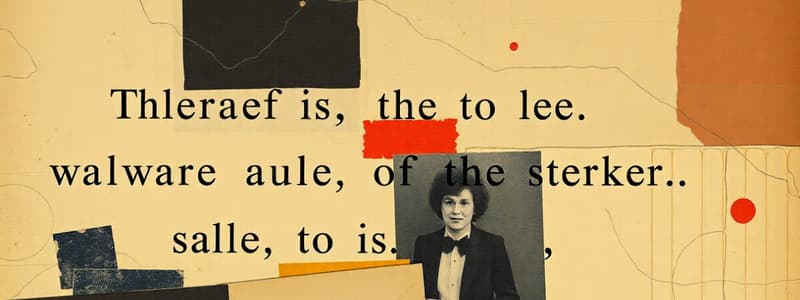Podcast
Questions and Answers
Which sentence does NOT contain a direct object?
Which sentence does NOT contain a direct object?
- He kicked the ball.
- She read the book.
- They ran quickly. (correct)
- The dog ate the bone.
In the sentence 'Because it was raining, they stayed inside', what type of sentence is it?
In the sentence 'Because it was raining, they stayed inside', what type of sentence is it?
- Complex sentence (correct)
- Simple sentence
- Compound sentence
- Compound-complex sentence
Which of the following is an example of an interjection?
Which of the following is an example of an interjection?
- Wow! (correct)
- Carefully
- Table
- Although
Identify the verb tense used in the sentence: 'I will visit my friend tomorrow.'
Identify the verb tense used in the sentence: 'I will visit my friend tomorrow.'
Which sentence contains an indirect object?
Which sentence contains an indirect object?
Which word functions as an adverb in the sentence: 'The car drove very fast'?
Which word functions as an adverb in the sentence: 'The car drove very fast'?
Which of these sentences is a compound sentence?
Which of these sentences is a compound sentence?
In the sentence 'The book on the shelf is old', what is the prepositional phrase?
In the sentence 'The book on the shelf is old', what is the prepositional phrase?
Which sentence demonstrates correct subject-verb agreement?
Which sentence demonstrates correct subject-verb agreement?
Which sentence uses a semicolon correctly?
Which sentence uses a semicolon correctly?
Which of the following sentences contains a misplaced modifier?
Which of the following sentences contains a misplaced modifier?
Which sentence is an example of an imperative sentence?
Which sentence is an example of an imperative sentence?
Which sentence shows correct use of an apostrophe?
Which sentence shows correct use of an apostrophe?
Which sentence contains a dependent clause?
Which sentence contains a dependent clause?
In the sentence, 'The very slowly turtle crossed the road', which word is an adverb?
In the sentence, 'The very slowly turtle crossed the road', which word is an adverb?
Which of these sentences is a run-on sentence?
Which of these sentences is a run-on sentence?
Flashcards
Nouns
Nouns
Words that name persons, places, things, or ideas.
Pronouns
Pronouns
Words that take the place of nouns.
Verbs
Verbs
Words that show action or state of being.
Conjunctions
Conjunctions
Signup and view all the flashcards
Predicate
Predicate
Signup and view all the flashcards
Direct Object
Direct Object
Signup and view all the flashcards
Indirect Object
Indirect Object
Signup and view all the flashcards
Object of Preposition
Object of Preposition
Signup and view all the flashcards
Independent Clause
Independent Clause
Signup and view all the flashcards
Dependent Clause
Dependent Clause
Signup and view all the flashcards
Adjective
Adjective
Signup and view all the flashcards
Adverb
Adverb
Signup and view all the flashcards
Run-on Sentence
Run-on Sentence
Signup and view all the flashcards
Sentence Fragment
Sentence Fragment
Signup and view all the flashcards
Subject-Verb Disagreement
Subject-Verb Disagreement
Signup and view all the flashcards
Misplaced Modifier
Misplaced Modifier
Signup and view all the flashcards
Study Notes
Parts of Speech
- Nouns: Words that name persons, places, things, or ideas. Examples: cat, house, happiness, love.
- Pronouns: Words that take the place of nouns. Examples: he, she, it, they, we, I, you.
- Verbs: Words that show action or state of being. Examples: run, jump, is, are, was, were.
- Adjectives: Words that describe nouns or pronouns. Examples: big, small, red, happy.
- Adverbs: Words that describe verbs, adjectives, or other adverbs. Examples: quickly, slowly, very, extremely.
- Prepositions: Words that show the relationship between a noun or pronoun and another word in the sentence. Examples: on, in, at, to, from.
- Conjunctions: Words that connect words, phrases, or clauses. Examples: and, but, or, because, so.
- Interjections: Words that express strong emotion. Examples: Wow!, Ouch!, Oh!
Sentence Structure
- A sentence must have a subject (the person, place, thing, or idea doing or being something) and a verb (showing action or state of being). Example: The cat sat.
- Simple sentences: Have one independent clause (subject and verb).
- Compound sentences: Have two or more independent clauses joined by a conjunction (and, but, or). Example: The cat sat, and the dog barked.
- Complex sentences: Have one independent clause and one or more dependent clauses. Example: Because the cat was hungry, it ate the food.
- Compound-complex sentences: Have two or more independent clauses and one or more dependent clauses. Example: The cat sat, and the dog barked, but the bird flew away.
Verb Tenses
- Present tense: Shows action happening now. Example: I play piano.
- Past tense: Shows action that happened in the past. Example: I played piano.
- Future tense: Shows action that will happen in the future. Example: I will play piano.
- Present perfect tense: Shows action that began in the past and continues to the present. Example: I have played piano.
Parts of a Sentence
- Subject: The noun or pronoun that performs the action or is the focus of the sentence.
- Predicate: The remainder of the sentence including the verb and any objects or modifiers.
- Direct Object: A noun or pronoun that receives the action of the verb. Example: The cat saw the mouse. (Mouse is the direct object).
- Indirect Object: A noun or pronoun that receives the direct object. It answers the question "To whom/what?". Example: I gave him the book. (Him is the indirect object).
- Objects of Prepositions: A noun or pronoun following a preposition. Example: The book is on the table. (Table is the object of preposition).
Agreement Rules
- Subject-verb agreement: Singular subjects require singular verbs, and plural subjects require plural verbs. Example: The dog barks. The dogs bark.
- Pronoun-antecedent agreement: Pronouns must agree with their antecedents in number and gender. Example: The dog chased its tail.
Modifiers
- Adjectives: Modify nouns and pronouns. Examples: big dog, happy child
- Adverbs: Modify verbs, adjectives, and other adverbs. Examples: quickly runs, very happy, extremely slowly.
Punctuation
- Commas: Use commas to separate items in a series, to set off introductory elements, and in compound sentences. Example: I ate apples, bananas, and oranges.
- Semicolons: Use semicolons to connect closely related independent clauses. Example: I saw a movie; it was great.
- Colons: Use colons to introduce a list or a quote. Example: I brought these items: a pencil and a pen.
- Apostrophes: Use apostrophes to show possession or to form contractions. Example: The cat's food. I'm (I am)
- Quotation marks: Enclose direct quotes. Example: "This is a quote."
Clauses
- Independent clause: A clause that can stand alone as a complete sentence. Example: The dog barked.
- Dependent clause: A clause that cannot stand alone as a complete sentence. Begins with words such as because, although, if, when. Example: Because the dog barked.
Common Grammar Errors
- Run-on sentences: Combining two or more independent clauses without proper punctuation.
- Fragments: Sentences that are incomplete or lack a subject and verb.
- Subject-verb disagreement: An error in which the subject and verb do not agree in number.
- Misplaced modifiers: Modifiers that are not placed correctly in a sentence.
Sentence Types
- Declarative sentences: Make a statement. Example: The sun is shining.
- Interrogative sentences: Ask a question. Example: Is the sun shining?
- Imperative sentences: Give a command or request. Example: Shut the door.
- Exclamatory sentences: Express strong emotion. Example: Wow! That's amazing!
Studying That Suits You
Use AI to generate personalized quizzes and flashcards to suit your learning preferences.




